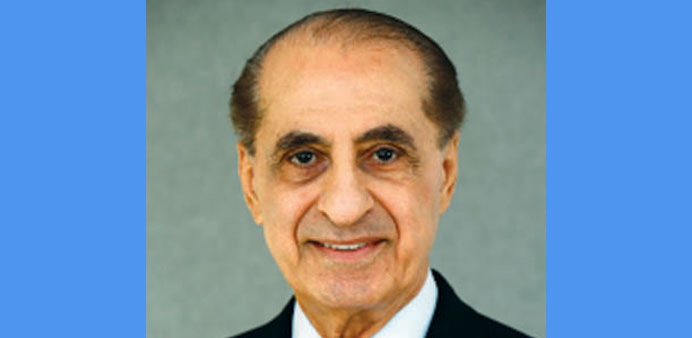Abed: Ultimate price depends on how much you invest in the infrastructure to deliver gas.
By Pratap John/Chief Business Reporter
Qatar can consider establishing a benchmark for gas as “it is the leading producer and supplier with a history of steady supply” to established customers under long-term contracts, says George T Abed, senior counsellor and director (Africa & the Middle East) at the Institute of International Finance.
“I think there is some merit in Qatar considering a benchmark for its own gas. Then others (producers) will have to price their gas relative to that,” Abed said in an interview with Gulf Times here.
While it is “possible to have benchmarks” for gas, Abed emphasised that “it won’t be easy, universal, or perhaps even useful” as in the case of benchmarks for oil markets.
He said benchmarking gas would have been “simple”, if there were only two or three sources supplying all the gas in the world.
“The cost structure of the gas that goes into the final price is so different that it is very difficult to establish a clear benchmark in order for others to price gas around it.
“Heavy investment is required to extract gas and deliver it. Basically, the gas market is made up of an oligopoly of suppliers, whereas oil is being extracted from a number of sources. And in market-based economies such as Canada, the US and other places, we have thousands of operators who can either undersell competitors or can deliver products at different prices… so it is a different market,” the Washington, DC-based Abed points out.
Asked whether there was a glut in the gas market, Abed said, “Countries such as the US and Australia are developing their capabilities. Australia has already invested in LNG facilities…and at some point; US will become a major player in the liquefied natural gas market.”
On whether the market will shift from term contracts to spot basis, Abed said, “It is difficult to say. Gas is not the same as that of oil. Oil is very transportable… liquid that can be loaded onto ships and taken anywhere. You can buy oil anywhere, in any port in the world…pretty much at the same price across the world. This is because the cost of transportation is minimal relative to the sale price.”
In the case of gas, Abed said, “The delivery system one has to build – whether it is LNG plants and ships, pipelines or liquefaction facilities… is enormous. And therefore, the ultimate price depends on how much you invest in the infrastructure to deliver gas. The ultimate price of the gas depends on all of that investment.”
Qatar, Abed asserted, has already the “first mover” advantage in the global gas market.
“Qatar has enormous reserves. Its cost structure is somewhat lower. It has established relationships in the market. And I think Qatar will remain a leading supplier of gas for quite some time,” said Abed, a former chairman of the Palestine Monetary Authority and special adviser to the IMF managing director.

